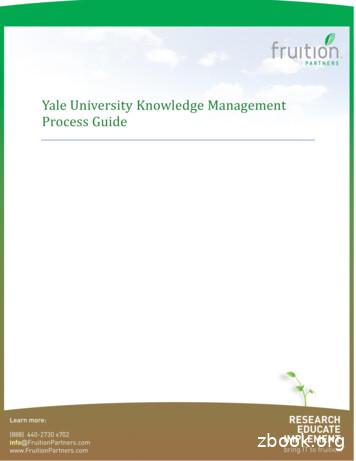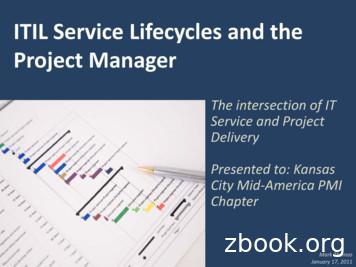Project Management Body Of Knowledge (PMBOK ) Guide Th5 Edition
Project Management Body Of Knowledge(PMBOK ) Guide – 5th EditionFebruary 21, 20131
PMBOK 4th EditionPMBOK 5th EditionReleased in 2008Released in 20135 Process Groups5 Process Groups9 Knowledge Areas10 Knowledge Areas42 Processes47 ProcessesPMBOK 5th Edition2
PMBOK 4th EditionPMBOK 5th Edition Integration Management Scope Management Time Management Cost Management Quality Management Human ResourcesManagement Communications Management Risk Management Procurement Management Integration Management Scope Management Time Management Cost Management Quality Management Human ResourcesManagement Communications Management Risk Management Procurement Management Stakeholder ManagementPMBOK 5th Edition3
PMBOK4PMBOK5Chapter 5 Project Scope ManagementChapter 5 Project Scope Management5.1 Plan Scope Management5.1 Colect Requirements5.2 Collect Requirements5.2 Define Scope5.3 Define Scope5.3 Create WBS5.4 Create WBS5.4 Verify Scope5.5 Validate Scope5.5 Control Scope5.6 Control ScopePMBOK 5th Edition4
5.1 Plan Scope ManagementThe process of creating a scope management plan thatdocuments how the project scope will be defined,validated, and controlled.The key benefit of this process is that it providesguidance and direction on how scope will be managedthroughout the project.PMBOK 5th Edition5
5.1 Plan Scope ManagementPMBOK 5th Edition6
5.1 Plan Scope ManagementPMBOK 5th Edition7
PMBOK4Chapter 6 Project Time Management6.1 Define Activities6.2 Sequence Activities6.3 Estimate Activity Resources6.4 Estimate Activity Durations6.5 Develop Schedule6.6 Control SchedulePMBOK 5th EditionPMBOK5Chapter 6 Project Time Management6.1 Plan Schedule Management6.2 Define Activities6.3 Sequence Activities6.4 Estimate Activity Resources6.5 Estimate Activity Durations6.6 Develop Schedule6.7 Control Schedule8
6.1 Plan Schedule Managementis the process of establishing the policies, procedures,and documentation for planning, developing, managing,executing and controlling the project schedule.The key benefit of this process is that it providesguidance and direction on how the project schedule willbe managed throughout the project.PMBOK 5th Edition9
6.1 Plan Schedule ManagementPMBOK 5th Edition10
6.1 Plan Schedule ManagementPMBOK 5th Edition11
PMBOK4PMBOK5Chapter 7 Project Cost ManagementChapter 7 Project Cost Management7.1 Plan Cost Management7.1 Estimate Costs7.2 Estimate Costs7.2 Define Budget7.3 Determine Budget7.3 Control Costs7.4 Control CostsPMBOK 5th Edition12
7.1 Plan Cost ManagementIs the process that establishes the policies, procedures,and documentation for planning, managing, expending,and controlling project costs.The key benefit of this process is that it providesguidance and direction on how the project costs will bemanaged throughout the project.PMBOK 5th Edition13
7.1 Plan Cost ManagementPMBOK 5th Edition14
7.1 Plan Cost ManagementPMBOK 5th Edition15
PMBOK4Chapter 10 Project CommunicationsManagement10.1 Identify Stakeholders10.2 Plan Communications10.3 Distribute InformationNew process10.4 Manage Stakeholder Expectations10.5 Report PerformancePMBOK 5th EditionPMBOK5Chapter 10 Project CommunicationsManagementMoved to 13.110.1 Plan Communications Management10.2 Manage Communications10.3 Control CommunicationsMoved to 13.3Became Tool and Technique of 10.216
10.1 Plan Communications ManagementThe process of developing an appropriate approach andplan for project communications based on stakeholder’sinformation needs and requirements, and availableorganizational assets.The key benefit of this process is that it identifies anddocuments the approach to communicate mosteffectively and efficiently with stakeholders.PMBOK 5th Edition17
10.1 Plan Communications ManagementPMBOK 5th Edition18
10.1 Plan Communications ManagementPMBOK 5th Edition19
10.2 Manage CommunicationsIs the process of creating, collecting, distributing,storing, retrieving, and the ultimate disposition of projectinformation in accordance to the communicationsmanagement plan.The key benefit of this process is that it enables anefficient and effective communications flow betweenproject stakeholders.PMBOK 5th Edition20
10.2 Manage CommunicationsInputs.1 was Stakeholder register.2 was Stakeholder management StrategyPMBOK 5th Edition21
10.2 Manage CommunicationsTools and Techniques.1 was Communication requirements analysis.4 is new.5 was process 10.5 Report PerformancePMBOK 5th Edition22
10.2 Manage CommunicationsOutputs:.3 and .4 are newPMBOK 5th Edition23
10.2 Manage CommunicationsPMBOK 5th Edition24
10.3 Control CommunicationsControl Communications is the process of monitoringand controlling communications throughout the entireproject life cycle to ensure the information needs of theproject stakeholders are met.The key benefit of this process is that it ensures anoptimal information flow among all communicationparticipants at any moment in time.PMBOK 5th Edition25
10.3 Control CommunicationsPMBOK 5th Edition26
10.3 Control CommunicationsPMBOK 5th Edition27
Chapter 13 Project Stakeholder Management13.1 Identify Stakeholders13.2 Plan Stakeholder Management13.3 Management Stakeholder Engagement13.4 Control Stakeholder EngagementPMBOK 5th Edition28
13.1 Identify StakeholdersIdentify Stakeholders is the process of identifying the peoplegroups, or organizations that could impact or be impacted by adecision, activity, or outcome of the project, analyzing anddocumenting relevant information regarding their interests,involvement, interdependencies, influence, and potential impact onproject success.The key benefit of this process is that it allows the project managerto identify the appropriate focus for each stakeholder or group ofstakeholders.PMBOK 5th Edition29
13.1 Identify Stakeholders.OUT: Stakeholder Management StrategyPMBOK 5th Edition30
13.1 Identify Stakeholders.PMBOK 5th Edition31
13.2 Plan Stakeholder ManagementIs the process of developing appropriate managementstrategies to effectively engage stakeholders throughoutthe project life cycle, based on the analysis of theirneeds, interests, and potential impact on projectsuccess.The key benefit of the process that it provides a clear,actionable plan to interact with project stakeholders tosupport the project’s interests.PMBOK 5th Edition32
13.2 Plan Stakeholder Management.PMBOK 5th Edition33
13.2 Plan Stakeholder Management.PMBOK 5th Edition34
13.3 Manage Stakeholder EngagementManage Stakeholder Engagement is the process ofcommunicating and working with stakeholders to meettheir needs/expectations, address issues as they occur,and foster appropriate stakeholder engagement inproject activities throughout the project life cycle.The key benefit of this process is that it allows theproject manager to increase support and minimizeresistance.PMBOK 5th Edition35
13.3 Manage Stakeholder Engagement.PMBOK 5th Edition36
13.3 Manage Stakeholder Engagement.PMBOK 5th Edition37
13.4 Control Stakeholder EngagementControl Stakeholder Engagement is the process ofmonitoring overall project stakeholder relationships andadjusting strategies and plans for engagingstakeholders.The key benefit of the process is that it will maintain orincrease the efficiency and effectiveness of stakeholderengagement activities as the project evolves and itsenvironment and its environment changes.PMBOK 5th Edition38
13.4 Control Stakeholder Engagement.PMBOK 5th Edition39
13.4 Control Stakeholder Engagement.PMBOK 5th Edition40
Changes to the ExamsThose taking the Certified Associate in ProjectManagement (CAPM ) Exam Before July 1, 2013 – Use the PMBOK 4th Edition After July 1, 2013 – Use the PMBOK 5th EditionThos taking the Project Management Professional(PMP ) Exam Before July 31, 2013 – Use the PMBOK 4th Edition After July 31, 2013 – Use the PMBOK 5th EditionPMBOK 5th Edition41
Questions!!PMBOK 5th Edition42
Chapter 5 Project Scope Management Chapter 5 Project Scope Management 5.1 Plan Scope Management 5.1 Colect Requirements 5.2 Collect Requirements 5.2 Define Scope 5.3 Define Scope 5.3 Create WBS 5.4 Create WBS 5.4 Verify Scope 5.5 Validate Scope 5.5 Control Scope 5.6 Control Scope PMBOK 5th Edition
A Guide to the Project Management Body of Knowledge (PMBOK Guide) - Fifth Edition 61 3 3 - PROJECT MANAGEMENT PROCESSES Table 3-1. Project Management Process Group and Knowledge Area Mapping 4. Project Integration Management 5. Project Scope Management 5.2 Collect 6. Project Time Management 6.4 Estimate 7. Project Cost Management 8. Project .
3 The TSP Body of Knowledge 7 Competency Area 1: TSP Foundations and Fundamentals 9 Knowledge Area 1.1: Knowledge Work 9 Knowledge Area 1.2: TSP Prerequisite Knowledge 12 Knowledge Area 1.3: TSP Principles 14 Knowledge Area 1.4: TSP Process Elements and Measures 15 Knowledge Area 1.5: TSP Quality Practices 17
1. Demonstrate knowledge of the triple constraint of project management 2. Demonstrate knowledge of the project management knowledge areas and process groups 3. Demonstrate knowledge of the project life cycle 4. Demonstrate knowledge of project selection methods 5. Demonstrate knowledge of work breakdown structures 6.
ACMPE and MGMA use the Body of Knowledge, go to The Origins and Importance of the Body of Knowledge for Medical Practice Management. Learn how to use the Body of Knowledge To learn the many ways you can use the information in this guide for your personal development, to improve your organization or educate others, go to Using the Body of Knowledge.
Project Issue Management Process Project Issue Management Process Template, version 1.0 (03.15.12) ii 1 Introduction The Project Issue Management Process is followed during the Execution phase of the Project Management Life Cycle throughout the project; however, issues may be identified at any stage of the project life cycle.File Size: 258KBPage Count: 8People also search forissue management processcontemporary issue management:contemporary issue management: quizletdefine opportunity management processacquisitions the issue management proces asana project management templates
RACI Knowledge User Knowledge Author Knowledge Reviewer (Content SME) Knowledge Manager / Coordinator(s) Knowledge Mgt Process Owner 1.0 Identify Knowledge AR 2.0 Author / Update Knowledge AR R 3.0 Review and Update Knowledge C R AR 4.0 Publish Knowledge I I I
Project management is the application of knowledge, skills, tools, and techniques to project activities to meet the project requirements. Project Management. Definitions. 14. A Guide to the Project Management Body of Knowledge (PMBOK) is a recognized standard for the project management profession
knowledge, the capture of tacit knowledge, which is hard to identify and manage, is a major challenge. The thesis uses Becerra-Fernandez et al.'s knowledge management framework to establish the requirements for knowledge management, and specifically highlighting the important role of tacit knowledge in organisational knowledge processes.























